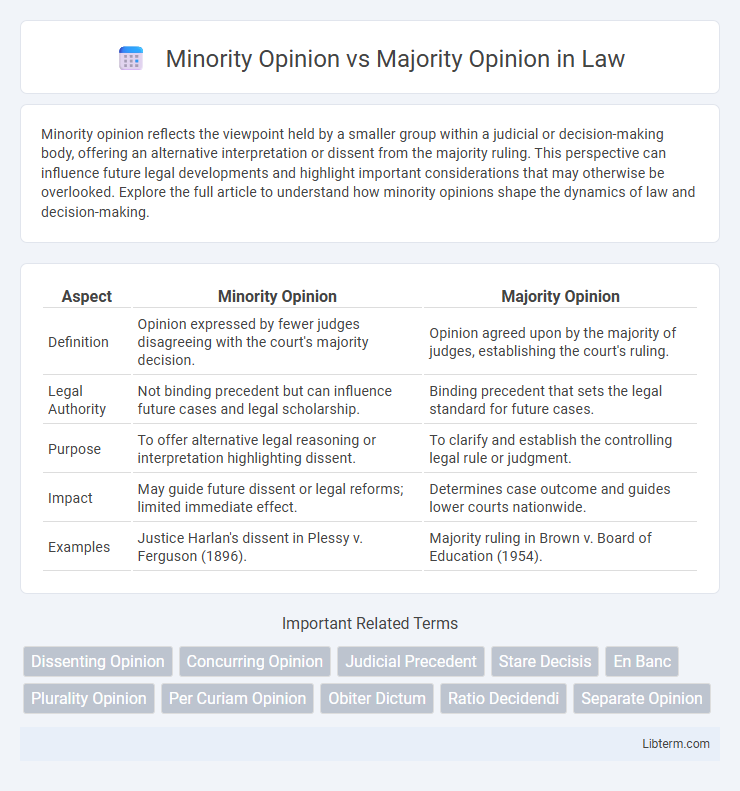Minority opinion reflects the viewpoint held by a smaller group within a judicial or decision-making body, offering an alternative interpretation or dissent from the majority ruling. This perspective can influence future legal developments and highlight important considerations that may otherwise be overlooked. Explore the full article to understand how minority opinions shape the dynamics of law and decision-making.
Table of Comparison
| Aspect | Minority Opinion | Majority Opinion |
|---|---|---|
| Definition | Opinion expressed by fewer judges disagreeing with the court's majority decision. | Opinion agreed upon by the majority of judges, establishing the court's ruling. |
| Legal Authority | Not binding precedent but can influence future cases and legal scholarship. | Binding precedent that sets the legal standard for future cases. |
| Purpose | To offer alternative legal reasoning or interpretation highlighting dissent. | To clarify and establish the controlling legal rule or judgment. |
| Impact | May guide future dissent or legal reforms; limited immediate effect. | Determines case outcome and guides lower courts nationwide. |
| Examples | Justice Harlan's dissent in Plessy v. Ferguson (1896). | Majority ruling in Brown v. Board of Education (1954). |
Understanding Minority and Majority Opinions
Minority opinions represent the viewpoints held by a smaller segment of judges or decision-makers that differ from the majority's conclusion, offering alternative legal interpretations or reasoning. Majority opinions establish the binding precedent as they reflect the consensus ruling agreed upon by more than half of the panel, forming the authoritative legal judgment. Understanding the distinction between minority and majority opinions is crucial for grasping the dynamics of judicial decision-making and the development of legal principles.
Historical Context of Majority vs Minority Perspectives
Throughout legal history, majority opinions have established binding precedents that shape jurisprudence, whereas minority opinions, often termed dissenting opinions, provide alternative interpretations and sometimes foreshadow future legal shifts. The U.S. Supreme Court's landmark cases, such as Brown v. Board of Education, demonstrate how minority opinions later influenced majority rulings and societal change. These evolving dynamics reflect broader societal tensions between dominant and marginalized viewpoints in legal and cultural contexts.
The Role of Majority Opinion in Society
Majority opinion serves as a foundational element in democratic societies by reflecting the collective will and guiding legal precedents and policy decisions. It establishes norms and expectations that influence social behavior and institutional governance. Enforcing the majority opinion ensures stability and coherence in legal systems, promoting societal order and facilitating effective decision-making processes.
Influence and Significance of Minority Opinion
Minority opinions play a crucial role in shaping legal and social developments by preserving alternative interpretations that may influence future judicial decisions and legislation. These dissenting views provide a foundation for legal evolution, often anticipating shifts in societal values or highlighting potential flaws in majority reasoning. Over time, minority opinions can gain acceptance and transform into majority precedents, demonstrating their lasting significance in jurisprudence and policy reform.
Case Studies: Minority Opinion Shaping Change
Case studies reveal how minority opinions have historically influenced landmark legal reforms by challenging prevailing majority views and inspiring progressive dialogue within judicial systems. In Brown v. Board of Education, the dissenting opinions in earlier segregation cases fueled arguments that eventually dismantled racial segregation in education. These examples demonstrate that minority opinions can serve as catalysts for societal change by preserving alternative perspectives that later gain legal and cultural validation.
Psychological Factors Behind Conforming to Majorities
Psychological factors influencing conformity to majority opinions include the desire for social acceptance and fear of rejection, which often lead individuals to align their views with the majority to avoid conflict or isolation. Cognitive dissonance also plays a role, as people may adjust their beliefs to match group consensus, reducing internal psychological tension. Furthermore, informational social influence causes individuals to rely on the majority's judgment when uncertain, reinforcing conformity despite potential minority viewpoints.
The Dangers of Suppressing Minority Voices
Suppressing minority opinions in legal or organizational settings undermines democratic principles and limits diverse perspectives essential for balanced decision-making. Minority voices often highlight potential flaws or ethical concerns that the majority may overlook, preventing groupthink and fostering critical debate. Ignoring these dissenting views risks reinforcing systemic biases and hinders innovation by discouraging alternative viewpoints from influencing policy or jurisprudence.
Minority Opinion in Legal and Political Systems
Minority opinion in legal and political systems represents the views expressed by a smaller segment of judges or legislators who disagree with the majority's decision, serving as a crucial check on prevailing interpretations and policies. This dissenting perspective can influence future legal precedents and legislative reforms by highlighting alternative viewpoints and potential flaws in the majority's reasoning. Minority opinions often preserve debate, promote judicial transparency, and safeguard democratic principles by ensuring diverse viewpoints remain part of the official discourse.
Balancing Majority Rule with Minority Rights
Balancing majority rule with minority rights requires careful judicial consideration to ensure that the Majority Opinion reflects democratic principles while protecting fundamental rights of minority groups. Minority Opinions play a crucial role in highlighting alternative interpretations and safeguarding individual liberties against potential tyranny of the majority. Courts often rely on these dissenting views to preserve constitutional protections and promote legal evolution.
Fostering Constructive Dialogue Between Majority and Minority Groups
Fostering constructive dialogue between majority and minority groups requires recognizing the value of minority opinions in enriching democratic processes and decision-making. Encouraging open communication and active listening helps bridge gaps, reduce misunderstandings, and promote mutual respect across diverse perspectives. Establishing forums where minority voices are acknowledged and integrated contributes to more inclusive policies and societal cohesion.
Minority Opinion Infographic

 libterm.com
libterm.com